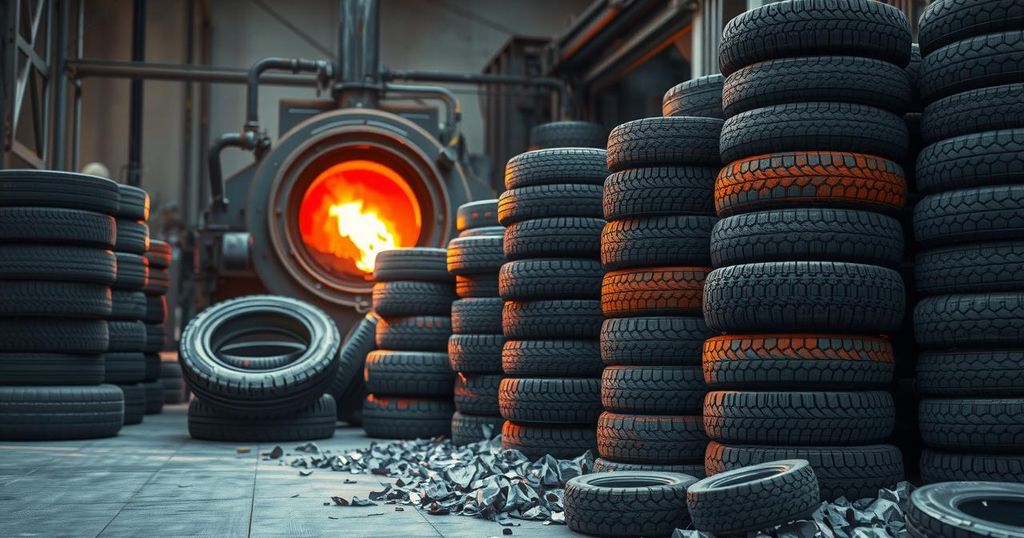Cars
ASIA, AUTOMOTIVE INDUSTRY, BBC, DEFRA, DEPARTMENT FOR ENVIRONMENT, FOOD AND RURAL AFFAIRS, ELLIOT MASON, ENVIRONMENTAL IMPACT, EUROPE, INDIA, INFRASTRUCTURE, MASON, NORTHAMPTON, ON, RECYCLING, RUBBER, RUSHDEN, TRA, TYRE RECOVERY ASSOCIATION, UK, UNITED KINGDOM, WASTE MANAGEMENT
Lena Nguyen
0 Comments
UK Tyre Exports: Health Risks and Environmental Controversy in India
Investigation reveals that millions of UK tyres exported to India for recycling are instead incinerated in illegal furnaces, leading to severe health and environmental issues. The majority are diverted to the black market despite strict regulations purportedly in place, with calls for government reform to address the situation. The UK must reclassify tyres as hazardous waste to prevent further damage to both health and the environment.
Millions of tyres exported from the UK to India for recycling are being incinerated in makeshift furnaces, resulting in significant health and environmental hazards. An investigative report by the BBC reveals that the majority are sold on the Indian black market, and industry experts acknowledge the widespread knowledge of this malpractice within the sector. Elliot Mason, a prominent figure in tyre recycling, remarked, “I don’t imagine there’s anybody in the industry that doesn’t know it’s happening.”
Campaigners and industry specialists, including the Tyre Recovery Association (TRA), assert that the UK government is aware of the country’s troubling status as a leading exporter of waste tyres. The Department for Environment, Food and Rural Affairs (Defra) asserts it imposes strict regulations on these exports, including severe penalties for violations. Normally, garages charge a recycling fee of about £3-6 per tyre change, which is intended to ensure proper recycling.
Each year, the UK generates approximately 50 million waste tyres, with nearly half being exported to India, where they are expected to be processed legitimately. These tyres are typically compressed into large bales before departure. However, evidence shows that approximately 70% of these tyres are diverted to illegal pyrolysis plants, where they are subjected to extreme heat in unsafe conditions, producing hazardous emissions and contributing to serious health risks.
The BBC, in collaboration with SourceMaterial, tracked shipments of UK tyres, concluding that a significant proportion ends up in illegal facilities. Dramatic drone footage captured the dire circumstances around these sites, which culminated in thousands of tyres being burned. A local company acknowledged processing imported tyres but maintained that their operations are legal and non-harmful.
In India, an environmental attorney informed the BBC that many pyrolysis plants operate without legal licenses, creating a public health crisis. Reports from villages near these plants indicated widespread health problems among the local populace. Upon visiting one such site, the BBC documented the environmental degradation, including polluted waterways and deteriorating air quality. A tragic incident last January resulted in multiple fatalities due to an explosion at a pyrolysis plant processing European tyres.
Although some businesses profit by exporting tyres to India rather than investing in proper recycling infrastructure, Mason insists on ethical practices, arguing that it is crucial to account for where the tyres ultimately end up. Regulatory loopholes, such as the T8 exemption, allow lesser-regulated operators to export significant quantities of tyres, often surpassing legal limits.
Recent investigations uncovered dealers openly acknowledging their practices, revealing that some exported more tyres than legally permitted. Defra announced that the UK government is contemplating revisions to waste exemptions in light of these concerns, echoing Australia’s recent prohibition against exporting baled tyres, which was prompted by discoveries that less than half reached designated recycling facilities.
Industry leaders emphasize the urgent need for government intervention, calling for tighter controls to classify tyres as hazardous waste. This pressing issue necessitates immediate action to protect public health and the environment from the detrimental effects of improper waste management, thereby ensuring a more sustainable future for tyre recycling.
In conclusion, the exportation of UK tyres to India for recycling has become a serious concern involving health risks and environmental degradation. Despite regulations intended to ensure responsible recycling practices, a significant portion of these tyres is diverted to illegal pyrolysis plants. Increased oversight and legislative changes are essential to mitigate these issues and redefine tyres as hazardous waste, ensuring their proper processing and safeguarding public health.
Original Source: www.bbc.com




Post Comment